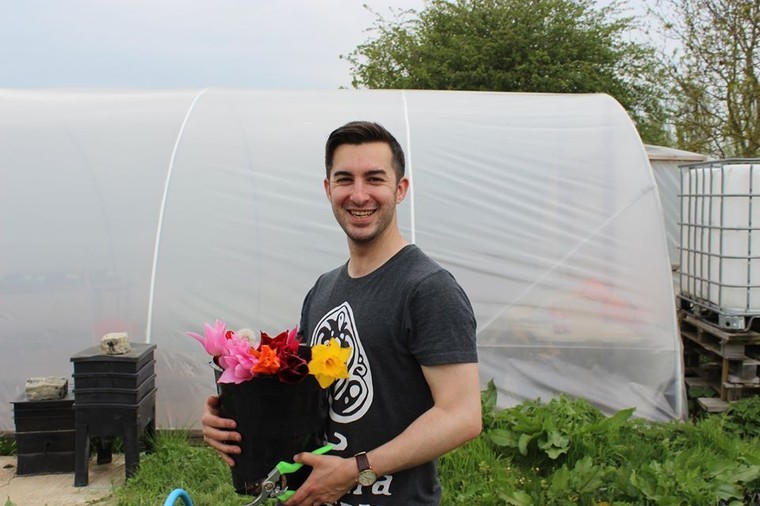In August 2018 the ELC was granted temporary planning permission for their second site in East Sussex to create three new small farms.
An 18.5 acre field, previously farmed as a single maize crop and suffering soil compaction, is set to become home to three new small farms practising agro-ecological farming — the application of ecology in agriculture.
The Ecological Land Cooperative works to create clusters of accessible, low impact, residential and ecologically managed smallholdings.
Their first site, Greenham Reach, in Mid Devon was the first of its kind. Granted permanent planning permission in 2018 — after five years of temporary permission — the three small farms at Greenham have gone from strength to strength bringing biodiversity, employment, and ecological and economic resilience to the area.
Two of the three plots in Arlington have already been taken by two industrious, green fingered young couples.
Sinead and Adam of Aweside Farm started their journey as farmers in London. Working a small, rented patch of land in East London, producing edible flowers, speciality leaves and heritage vegetables for restaurants across the city, the pair decided to move to pastures new and settle for more permanent roots – an opportunity created by the ELC.
Not satisfied with the idea of solely pursuing sustainable production Sinead & Adam took the plot at ELC, “to take our growing further and dedicate our lives and work to a piece of land that we could love, nurture and most importantly to us – regenerate. We want to try our hands at attempting to fix the broken, through agroecological and regenerative farming practices.”
“It’s no secret that access into farming for new entrants is really hard here in the UK and given our backgrounds of growing up in cities with no links to food and farming, the chances of us being able to follow and pursue livelihoods in this sector were going to be slim. But the ELC have really shaken things up to create opportunities for a new generation of farmers to create the changes that are needed within agriculture.”
Emily and Chris of Fanfield Farm are also new ELC stewards on the Arlington site.
Their passion for good food has inspired them to focus on producing seasonal and organic veg boxes to Arlington and the surrounding areas — a novel form of healthy, local food being delivered to your door through a Community Supported Agriculture (CSA) scheme. CSA’s are a popular way farmers can connect with their customers in a relationship that shares the risk and the bounty of the growing season between the growers and the eaters.
Fanfield CSA is the main thrust of their business aiming to feed 200 local households. CSAs are embedded in the communities they serve providing local food to local people.
“At first glance it seemed that the ELC were too good to be true, but our journey is proof that they are not. A lot needs to change in the UK. We need to go back to smaller farms and move away from large monoculture agriculture. We have taken too much from our soils for too long. Moving back to small farms and people growing food locally is incredibly important, and promoting practices that replenish our soil is a very important part of our plan.”
The ELC exists to make a working countryside a reality for those choosing to farm in a way that works with nature. By rolling out their ‘cluster farm’ model, where ELC land is protected in perpetuity for agro-ecological use and affordability, their second site in Arlington will set another example of how to revitalise our rural economies and landscape.
Plots for new entrants farmers are available at three ELC sites. One plot remains available at Arlington, East Sussex with other plots at Sparkford in South Somerset and Gower, South Wales.
The opportunity to begin small-scale agroecological farming has historically been limited. High land prices, a lack of access to skills training and resources and no farm subsidy mean that for a long time small scale farmers have had huge hurdles to overcome.
The ELC work to change this.
Purchasing agricultural land and dividing it into small farm plots of between three and 10 acres, the ELC applies for planning permission for agriculturally tied, rural workers’ dwellings. ELC provide shared site infrastructure including a track, barn, rainwater collection system and off grid power. They also offer assistance to new entrant farmers in the form of business support and mentoring to get the new farms off the ground.
This is all with a view to allowing new entrant farmers to access land and hit the ground running; the ELC interface with the planning authorities and take care of permissions, enabling a new generation of agroecological farmers to thrive and survive on the land.
The ELC is a multi-stakeholder cooperative with investor members providing the finance for the cooperative’s core work. The ELC is launching their next community share offer in Spring 2020 offering up to 3% interest.
Pictured: Adam Smith, Aweside Farm




